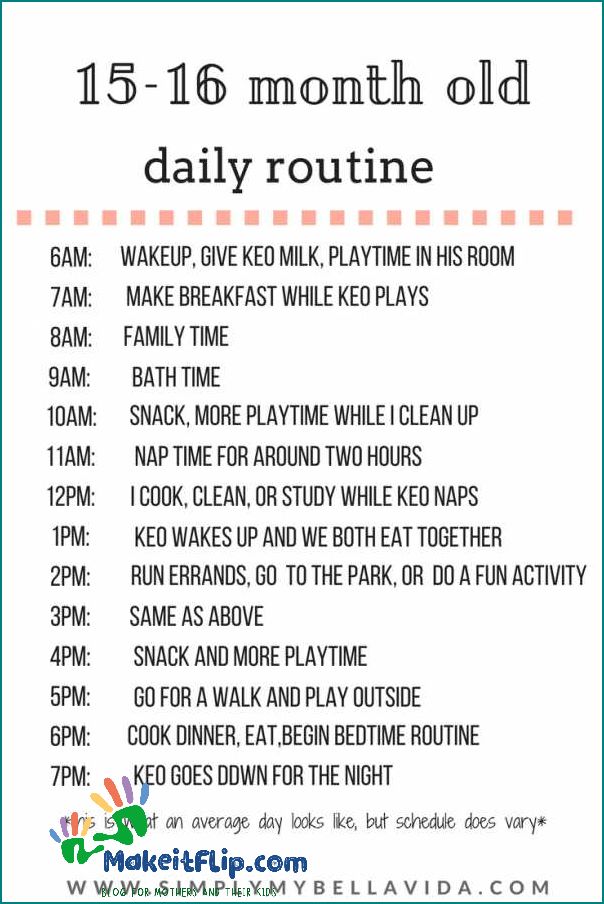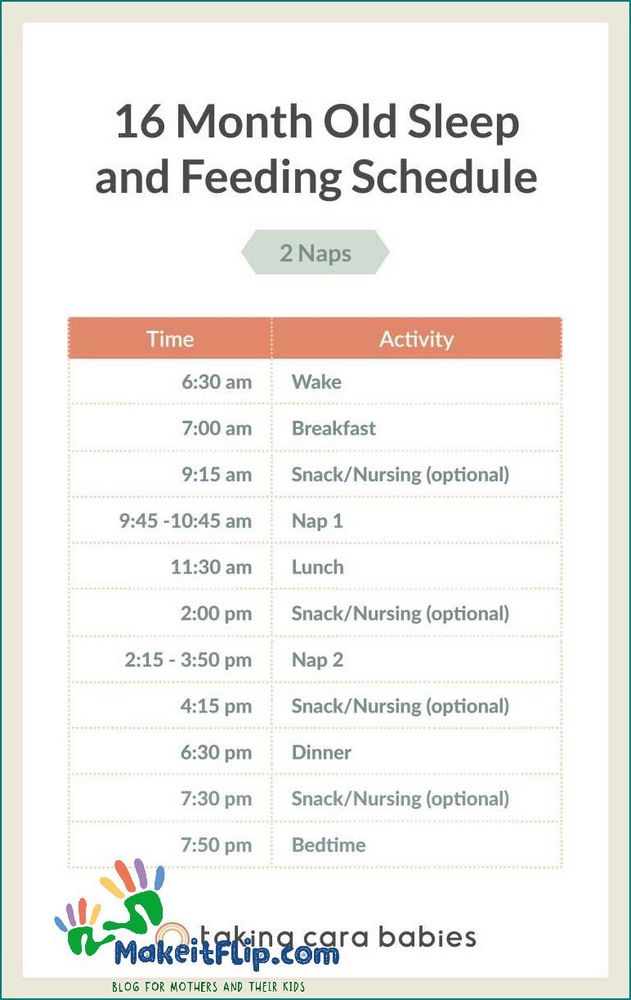Contents
Tips and Sample Routine for Establishing a Sleep Schedule for Your 16-Month-Old

When your little one reaches 16 months old, their sleep schedule becomes even more important for their overall development and well-being. At this age, toddlers need an average of 11-14 hours of sleep per day, including naps. Establishing a consistent sleep routine can help ensure that your 16-month-old gets the rest they need.
One tip for maintaining a healthy sleep schedule is to establish a regular bedtime. This can help signal to your child that it’s time to wind down and prepare for sleep. Additionally, creating a calm and soothing environment in their bedroom can promote relaxation and better sleep quality.
Another important aspect of a 16-month-old’s sleep routine is naptime. Most toddlers at this age still require one or two naps during the day. These naps should be scheduled at consistent times to help regulate their internal clock and promote better sleep at night.
It’s also important to be mindful of your child’s sleep cues. Signs that they may be tired include rubbing their eyes, yawning, or becoming fussy. By recognizing these cues and responding promptly, you can help prevent overtiredness and make it easier for your 16-month-old to fall asleep and stay asleep.
Remember, every child is different, and what works for one may not work for another. It may take some trial and error to find the perfect sleep routine for your 16-month-old. However, with patience and consistency, you can help your little one establish healthy sleep habits that will benefit them now and in the future.
Tips for Establishing a 16 Month Old Sleep Schedule
Establishing a consistent sleep schedule for your 16-month-old can greatly benefit their overall health and well-being. Here are some tips to help you create a successful sleep routine:
| 1. Stick to a regular bedtime: | Set a specific time for your child to go to bed each night and try to stick to it as closely as possible. This will help regulate their internal clock and promote better sleep. |
| 2. Create a calming bedtime routine: | Establish a consistent routine leading up to bedtime, such as giving your child a bath, reading a book, or singing a lullaby. This will signal to your child that it’s time to wind down and prepare for sleep. |
| 3. Limit daytime naps: | Ensure that your child is not taking excessively long naps during the day, as this can interfere with their ability to fall asleep at night. Aim for one or two shorter naps to help maintain a consistent sleep schedule. |
| 4. Create a sleep-friendly environment: | Make sure your child’s bedroom is dark, quiet, and at a comfortable temperature. Consider using blackout curtains, white noise machines, or a nightlight to create a soothing sleep environment. |
| 5. Be consistent: | Consistency is key when establishing a sleep schedule. Try to follow the same routine every night and be consistent with your expectations and boundaries. This will help your child understand what is expected of them at bedtime. |
| 6. Be patient: | It may take some time for your child to adjust to a new sleep schedule. Be patient and persistent, and eventually, they will adapt to the routine. Consistency and patience are key to success. |
By following these tips, you can help establish a healthy and consistent sleep schedule for your 16-month-old, promoting better sleep and overall well-being.
Consistency is Key
When it comes to a 16-month-old’s sleep schedule, consistency is key. Establishing a regular sleep routine can help your child develop healthy sleep habits and ensure they are getting the rest they need.
Consistency starts with setting a consistent bedtime and wake-up time for your 16-month-old. This helps regulate their internal clock and signals to their body when it’s time to sleep and wake up. Aim for a bedtime that allows for at least 11-12 hours of uninterrupted sleep.
In addition to a consistent bedtime, it’s important to establish a consistent nap schedule. Most 16-month-olds still need two naps a day, typically one in the morning and one in the afternoon. Try to schedule these naps at the same time each day to help your child anticipate and prepare for sleep.
Consistency also extends to the sleep environment. Create a calm and soothing sleep environment for your 16-month-old. This can include dimming the lights, playing soft music or white noise, and ensuring the room is at a comfortable temperature. Consistently creating this environment signals to your child that it’s time to sleep.
It’s important to note that while consistency is key, every child is different. Your 16-month-old may have unique sleep needs and preferences. Pay attention to their cues and adjust their sleep schedule as needed. Consistency, combined with flexibility, can help you find the right sleep routine for your child.
Remember, establishing a consistent sleep schedule takes time and patience. Stick with it and you’ll likely see improvements in your 16-month-old’s sleep patterns and overall well-being.
Create a Bedtime Routine

Establishing a consistent bedtime routine is important for a 16-month-old’s sleep schedule. A bedtime routine helps signal to your child that it’s time to wind down and prepare for sleep. Here are some tips for creating a bedtime routine:
| 1. Set a consistent bedtime: | Choose a specific time for your child to go to bed each night. This will help regulate their internal clock and make falling asleep easier. |
| 2. Create a calming environment: | Dim the lights, play soft music, or use a white noise machine to create a soothing atmosphere in your child’s bedroom. |
| 3. Establish a bedtime routine: | Develop a series of activities that you consistently do before bed, such as giving your child a bath, reading a book, or singing a lullaby. This routine will help signal to your child that it’s time to sleep. |
| 4. Avoid stimulating activities: | Avoid activities that may excite or energize your child before bed, such as rough play or watching stimulating TV shows. Instead, focus on calm and quiet activities. |
| 5. Be consistent: | Consistency is key when it comes to a bedtime routine. Try to follow the same routine every night, even on weekends or during travel, to help your child adjust and know what to expect. |
By creating a bedtime routine for your 16-month-old, you can help promote better sleep and establish healthy sleep habits that will benefit them in the long run.
Limit Daytime Naps
As your 16-month-old continues to grow and develop, it’s important to establish a consistent sleep schedule to ensure they are getting the proper amount of rest. One key aspect of this schedule is limiting daytime naps.
At this age, your child may still need two naps per day, but you should aim to gradually transition them to one nap. This will help consolidate their sleep and ensure they are tired enough to sleep through the night.
Here is a sample schedule to help guide you:
| Time | Activity |
|---|---|
| 6:30 AM | Wake up |
| 9:30 AM | Morning nap (30-60 minutes) |
| 12:30 PM | Lunch |
| 1:30 PM | Afternoon nap (1-2 hours) |
| 4:30 PM | Snack |
| 7:30 PM | Bedtime routine |
| 8:00 PM | Bedtime |
Keep in mind that every child is different, so you may need to adjust this schedule to fit your child’s individual needs. Pay attention to their cues and make changes accordingly.
By limiting daytime naps and establishing a consistent sleep schedule, you can help ensure your 16-month-old gets the sleep they need for optimal growth and development.
Sample 16 Month Old Sleep Schedule
At 16 months old, establishing a consistent sleep schedule is important for your child’s overall well-being and development. Here is a sample sleep schedule that you can follow:
Bedtime: 7:30 PM
Nap 1: 9:30 AM – 11:00 AM
Nap 2: 2:30 PM – 4:00 PM
This schedule allows for a total of 12 hours of sleep, which is recommended for a 16-month-old. It is important to note that every child is different, so you may need to adjust the schedule to fit your child’s individual needs. Additionally, it is important to establish a consistent bedtime routine to help your child wind down and prepare for sleep.
Remember that consistency is key when it comes to sleep schedules, so try to stick to the same routine every day. This will help your child develop healthy sleep habits and ensure they are getting the rest they need for optimal growth and development.
FAQ about topic 16 Month Old Sleep Schedule Tips and Sample Routine
How many naps should a 16 month old take?
A 16 month old should typically take 2 naps per day.
What is a recommended bedtime for a 16 month old?
A recommended bedtime for a 16 month old is around 7-8pm.
How long should a 16 month old sleep at night?
A 16 month old should sleep for about 10-12 hours at night.
What can I do if my 16 month old is having trouble falling asleep?
If your 16 month old is having trouble falling asleep, you can try establishing a consistent bedtime routine, creating a calm and soothing sleep environment, and avoiding stimulating activities before bedtime.
Is it normal for a 16 month old to wake up during the night?
Yes, it is normal for a 16 month old to wake up during the night. They may have brief awakenings or may need comfort or assistance to fall back asleep.
I’m Diana Ricciardi, the author behind Makeitflip.com. My blog is a dedicated space for mothers and their kids, where I share valuable insights, tips, and information to make parenting a bit easier and more enjoyable.
From finding the best booster seat high chair for your child, understanding the connection between sciatica and hip pain, to exploring the benefits of pooping in relieving acid reflux, I cover a range of topics that are essential for every parent.
My goal is to provide you with practical advice and solutions that you can easily incorporate into your daily life, ensuring that you and your child have the best possible experience during these precious years.
